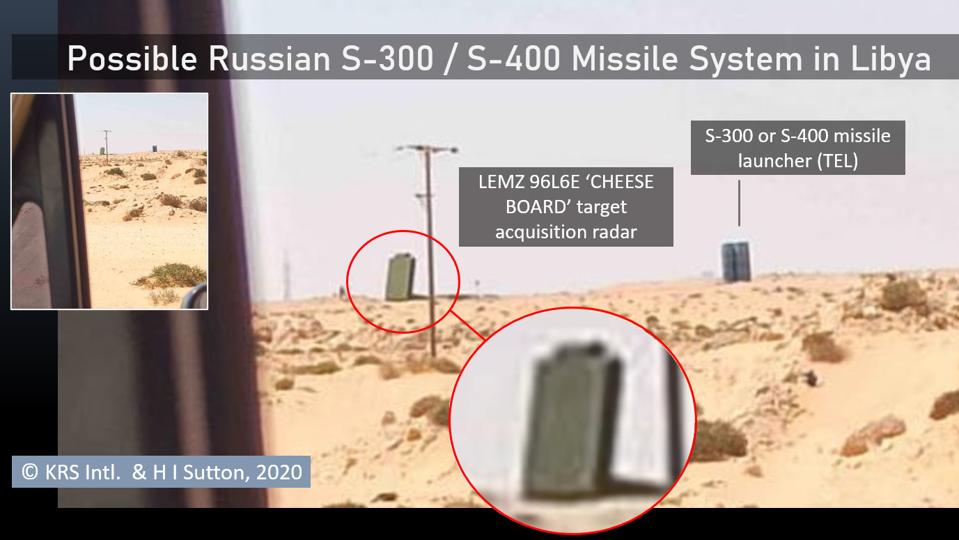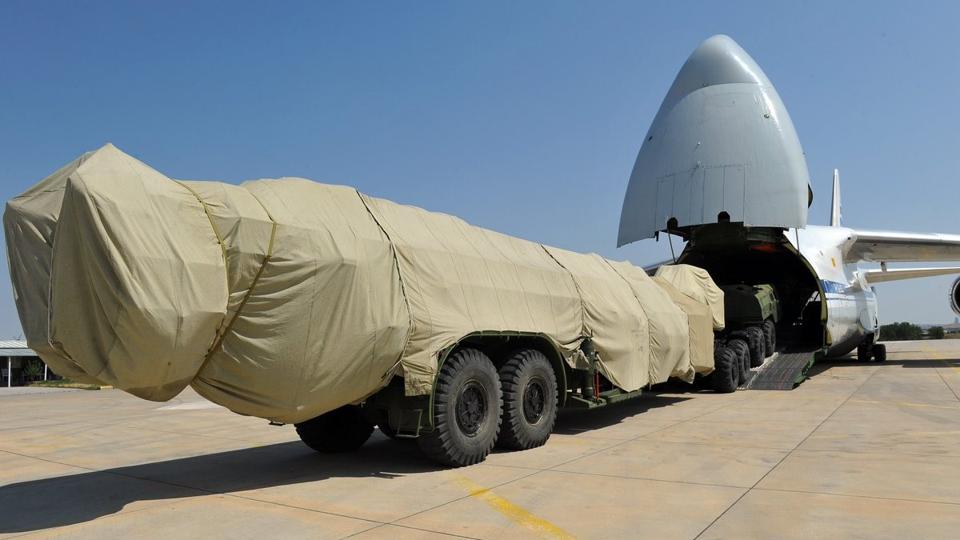Defense analysts are trying to confirm whether Russia has deployed a high-end air defense system to Libya. Pictures that circulated on social media appear to show a large radar and vertical missile tubes near Ra’s Lanuf in the east of the country. This could be the famous S-300, or the even more potent S-400 missile system. If so it could help tip the scales in the favor of Russia and its local allies against Turkish-backed forces.

The images were first posted online by Twitter user KRS Intl, who tracks the conflict in Libya. They were taken within the last few days.
From these first images there is a broad consensus among analysts that I have spoken to that the radar looks most like the Russian 96L6E model. This is a target acquisition radar associated with the S-300 surface-to-air missile (SAM) system. It is also used with the newer and more powerful S-400 Triumf system. NATO gives this radar the code name Cheese Board.
Next to the radar is what appears to be a missile TEL (transporter erector launcher). The missile tubes are in the upright position, ready to launch. This could be either S-300 or S-400.Recommended For You
The missiles would be there to protect Russia’s rapidly escalating involvement in the country. They have already brought in the Wagner private military contractors and fighter jets. But they and their allies face competent adversaries, including Turkish forces. Turkish TB2 drones have scored notable successes against Russian made air defenses. But the S-300 or S-400 would seriously hamper these operations.
“The Russians have quietly signaled that Sirte and Jufra are a red line, even though they have not gone as far as other countries in terms of public statements,” Aaron Stein, director of research at the Philadelphia-based Foreign Policy Research Institute, told me. Stein does not think that a deployment of such advanced air defense systems would be surprising. Russia has deployed similar systems, including the S-400, to protect its assets in Syria. “They appear to have taken a page out of their Syria playbook, which is to send a mixed squadron and to augment air defense assets in the country. The S-300, if it is real, joins the Pantsir S-1 short range system. Together they would make Turkey think about testing that red line.”
PROMOTEDMitsubishi Heavy Industries BRANDVOICE | Paid ProgramOil & Gas Outlook – Embracing Change From Now To 2040Grads of Life BRANDVOICE | Paid ProgramThe Value DREAMers Bring As EmployeesCivic Nation BRANDVOICE | Paid ProgramSilent Suffering: A Still Grieving LatinX Community Faces Compounding Crises
Ironically the S-400 SAM system is exactly what Russia has sold Turkey. This led the U.S. to cancel a sale of F-35 Lightning-II strike fighters to Turkey due to the concern Russia could use the SAM system’s sensors to mine valuable intelligence about the F-35’s capabilities.
So how could a new missile system have gotten to Libya? A super-heavy cargo plane flew from Russia to Al Khadim air base in Al Marj on August 3. The massive An-124 Ruslan, Russia’s equivalent of the C-5 Galaxy, took a circuitous route which went around Turkey.
Rob Lee, a PhD student at King’s College London who follows Russian defense policy, believes that the An-124 may be an important clue. “The An-124 is the only aircraft in Russian service that can carry all of the components for the S-300 and S-400. In every recent case where they have been transported by Russia, for example the S-400 to Turkey and Syria and the S-300 to Syria, it involved the An-124.”

The newly arrived missile systems may change the situation on the ground, especially if they are crewed by Russian professionals. Stein thinks that Russia takes advantage of the ambiguity of who is crewing the system. “The Russians like to play it so that you never know who is operating those SAM systems. So you never feel great about killing a SAM if it means also killing Russians. Especially when they have a mixed squadron that can over-match anything the Turks and their allies can bring to the party quickly.”
It is possible of course that the photos show a decoy. Russia uses inflatable systems to confuse military intelligence. All observers I discussed this with agree that this may be what we are seeing in the images. But even if they are fake, it likely points to a real system being there. This is because the inflatables are best as decoys to protect a real system, not a greater ruse. So whatever we are looking at in those pictures, it does suggest that either S-300 or S-400 is in the country.



